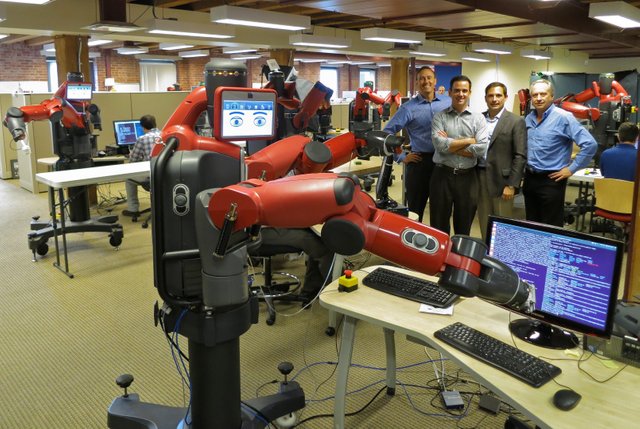Are You Enslaved? Robo-You Has The Answer
ARE YOU ENSLAVED? ROBO-YOU HAS THE ANSWER
INTRODUCTION
So as regular readers of my writings should all know by now, I have been promoting the idea that paid employment is a form of slavery based on debt.
It is something of an oversimplification to say all jobs are a kind of slavery, though. There are some jobs that count as work as I understand the definition (that is, mental or physical labour that is meaningful and fully rewarding for the person doing it). So, how to tell whether you are enslaved, or whether you are engaged in work?
I have devised a thought experiment that determines the answer.
THE THOUGHT EXPERIMENT
Imagine you have been given your very own 'Robo-you'. Robo-you is a humanoid robot with two key features: It looks like you, and it is programmed to do your job. It is deactivated at the moment, but if you should so choose, pushing the button on its back will turn Robo-you on, and when the time comes for you to commute to your place of employment, Robo-you will commute there instead, and do your job for you. But who gets the wages? You do. Yes, that's right, Robo-You goes off to work every day, and does your job, and you get paid.
If you had a Robo-you, would you press the button? Would you have this android version of yourself do your job for you, while you spent your time doing something else instead?
If your answer is 'no, I would not want Robo-you to do my job', then congratulations. Your employment provides you with genuine work. You think of your job as productive, meaningful, and rewarding.
If your answer is 'hell, yeah, send Robo-you to do my job, I got other things I would rather be doing', this goes to show that you are a wage-slave, somebody who derives little to no reward or pleasure from their job, with the paycheck that comes every now and then the only incentive for turning up every day.

(Would you rather this Baxter did your job for you? Image from wikimedia commons)
My educated guess is that most people would rather have Robo-you do their job, which means most people are wage-slaves. I base this guess on the observation that most people think the best days of the year are weekends, bank holidays and vacations, and the worst day of the week tends to be Monday. Oh, and the observation that number one on the 'list of things to do when I win the lottery' is 'quit my job'. Not everybody thinks that way. A few really like their jobs and can hardly wait for those annoying days off to end so they can get back to doing what they are passionate about. But most do not think that way at all. Most don't like their jobs, hence monday is the worst day, days off are better, and winning enough money to buy your freedom is best of all.
THE GRIM REALITY OF EMPLOYMENT (FOR MOST).
This goes to show that (rare exceptions to the contrary aside) most jobs are not personally engaging and fulfilling. They are 'miserable temporary necessities' Why necessary? Because these jobs need to be done in order to provide the products and services we want, which means somebody has got to do them. Why miserable? Because, while we want all the stuff of a runaway consumerist culture, we tend not to really want to do all the horrid jobs required to get all that stuff into our homes. Why temporary? Because one day robots that can do those jobs for us will exist.
The reality, for now, however, is that such robots do not exist, at least not robots sufficiently skilled enough to replace all wage-slaves. So the fact is that jobs are a miserable necessity. But we do not like to admit that, do we? We would rather pretend that jobs are great. That if we had no jobs life would be awful, and totally lacking in purpose.

(Image from wikimedia commons)
Imagine this story, which might be true for all I know. For all of human history, pain and surgery have gone together. If you had to have surgery, you were going to experience pain. In order to deal with this miserable situation, we invented reasons for why pain should accompany surgery. 'Without pain, how would we ever truly know pleasure?' 'Pain is there to strengthen moral fortitude!' We convinced ourselves that pain was necessary and good.
Then, one day, somebody goes and invents anaesthesia. Now, it is possible to have painless surgery. But we have indoctrinated ourselves with the delusion that pain is necessary and good. This results in people rejecting the idea of painless surgery.
Robots are like anaesthesia. Jobs are a miserable necessity and we have dealt with that fact by convincing ourselves that, actually, jobs are not miserable. Jobs are synonymous with work, vital for a healthy mind and spirit. But now that robots are coming to liberate us from our jobs, this cultural baggage so many of us carry, the attitude that all must have jobs, is a serious impediment to the flowering of a better way of life.
With appropriate readjustments to society, increasingly capable robots could be seen as liberators, come to free us from paid employment so we can devote our time and energy to projects we are passionate about. But if we insist on thinking of robots ‘stealing our jobs’ (even though what most of us really worry about is being cut off from the ability to have an income) this attitude might work to delay the transition to a post-job world that uses technological progress to benefit the majority.
This opinion piece was originally published on my blog
The important detail is who controls those robots and what do they do with the fruits of the robots' labor. I have bad news... It's not the 99% that own those robots. It's the 1%, and the .00001%.
Open source technology is the only hope we have of not being obsolete within the next 30-100 years.